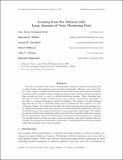| dc.contributor.author | Ortiz, Jose Javier Gonzalez | |
| dc.contributor.author | Mehta, Daryush | |
| dc.contributor.author | Stan, Jarrad Van | |
| dc.contributor.author | Hillman, Robert | |
| dc.contributor.author | Guttag, John V | |
| dc.contributor.author | Ghassemi, Marzyeh | |
| dc.date.accessioned | 2022-06-29T15:07:49Z | |
| dc.date.available | 2022-06-29T15:07:49Z | |
| dc.date.issued | 2019-08 | |
| dc.identifier.uri | https://hdl.handle.net/1721.1/143587 | |
| dc.description.abstract | Recently, researchers have started training high complexity machine learning models to clinical tasks, often improving upon previous benchmarks. However, more often than not, these methods require large amounts of supervision to provide good generalization guarantees. When applied to data coming from small cohorts and long monitoring periods these models are prone to overfit to subject-identifying features. Since obtaining large amounts of labels is usually not practical in many scenarios, expert-driven knowledge of the task is a common technique to prevent overfitting. We present a two-step learning approach that is able to generalize under these circumstances when applied to a voice monitoring dataset. Our approach decouples the feature learning stage and performs it in an unsupervised manner, removing the need for laborious feature engineering. We show the effectiveness of our proposed model on two voice monitoring related tasks. We evaluate the extracted features for classifying between patients with vocal fold nodules and controls. We also demonstrate that the features capture pathology relevant information by showing that models trained on them are more accurate predicting vocal use for patients than for controls. Our proposed method is able to generalize to unseen subjects and across learning tasks while matching state-of-the-art results. | en_US |
| dc.language.iso | en | |
| dc.relation.isversionof | https://proceedings.mlr.press/v106/ortiz19a.html | en_US |
| dc.rights | Article is made available in accordance with the publisher's policy and may be subject to US copyright law. Please refer to the publisher's site for terms of use. | en_US |
| dc.source | Proceedings of Machine Learning Research | en_US |
| dc.title | Learning from Few Subjects with Large Amounts of Voice Monitoring Data. | en_US |
| dc.type | Article | en_US |
| dc.identifier.citation | Ortiz, Jose Javier Gonzalez, Mehta, Daryush, Stan, Jarrad Van, Hillman, Robert, Guttag, John V et al. 2019. "Learning from Few Subjects with Large Amounts of Voice Monitoring Data.." Proc Mach Learn Res, 106. | |
| dc.contributor.department | Massachusetts Institute of Technology. Computer Science and Artificial Intelligence Laboratory | |
| dc.relation.journal | Proc Mach Learn Res | en_US |
| dc.eprint.version | Final published version | en_US |
| dc.type.uri | http://purl.org/eprint/type/ConferencePaper | en_US |
| eprint.status | http://purl.org/eprint/status/NonPeerReviewed | en_US |
| dc.date.updated | 2022-06-29T15:00:23Z | |
| dspace.orderedauthors | Ortiz, JJG; Mehta, D; Stan, JV; Hillman, R; Guttag, JV; Ghassemi, M | en_US |
| dspace.date.submission | 2022-06-29T15:00:30Z | |
| mit.journal.volume | 106 | en_US |
| mit.license | PUBLISHER_POLICY | |
| mit.metadata.status | Authority Work and Publication Information Needed | en_US |
